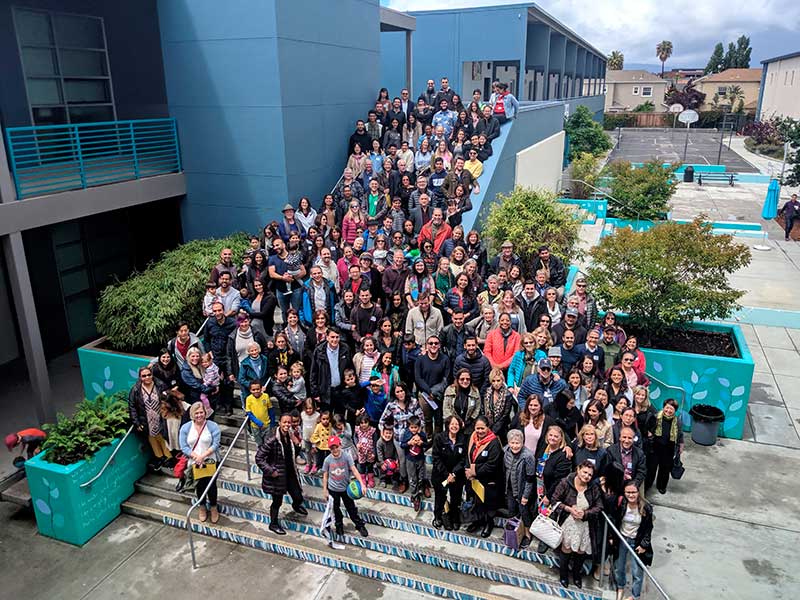
Northeast ‘farmers’ see bounty growing from youth training camps
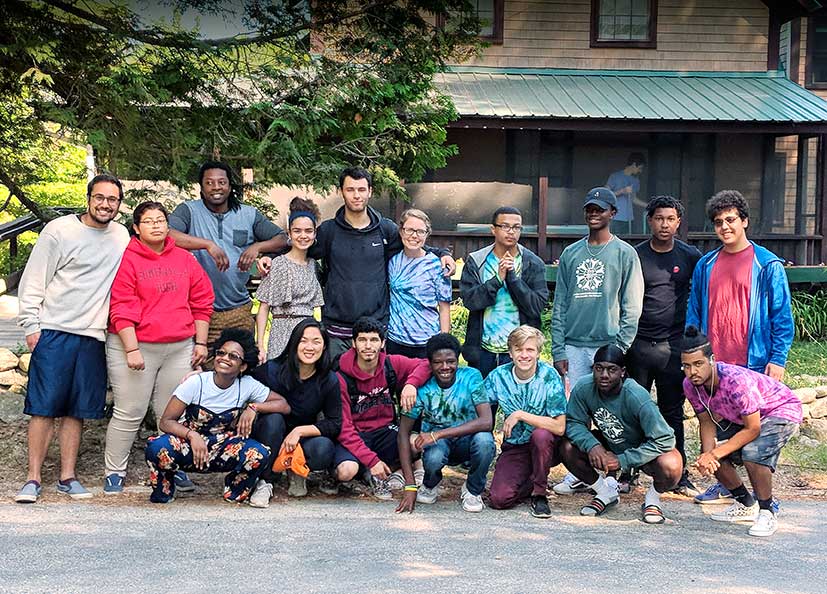

Once they committed to think more like “farmers” than backyard “gardeners,” Baha’is and friends in several Northeast localities began to cultivate opportunities for more young people to train, serve and build community.
The difference is an attitude and vision much like what is “needed to farm large areas of land, in comparison to gardening a few potted plants,” says Riwaj Thapaliya, a Baha’i in the Boston area.
With that vision, youth camps have been organized as spaces for intensive study, worship, practice and reflection on acts of service.
And the harvest so far? With stronger capacities and the accompaniment of friends, dozens of youths — typically high-school age or a little older — have used energy from the camps to help start children’s classes and junior youth groups.
Some are reaching out to invite other friends into the process. And many are finding closer connections in their hearts with Baha’i teachings and communities.
Thapaliya says the wisdom of “being farmers” was shared by Counselor Taraz Nadarajah, a senior Baha’i official visiting from Australia, in an early May gathering at Green Acre Baha’i School in Eliot, Maine. That event brought in people involved in Baha’i community-building activities across the Northeast.
Here are stories from three of those communities.
Boston: a newfound commitment
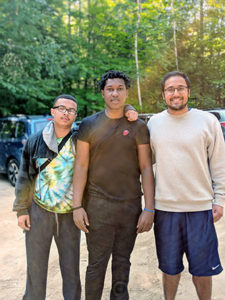
Coming out of last spring’s gathering at Green Acre, the Boston-area participants took a moment to evaluate how activity in neighborhoods was functioning after years of outreach and support, says Thapaliya, a young adult living in Chelsea.
“We reflected that while youths local to the population were certainly facilitating some activities in the neighborhoods, we had yet to see large flow of youths consistently enter the [training] institute process.
“With newfound commitment,” he says, “we were whispering to ourselves, ‘We need to stop gardening and begin farming.’”
Thus was born a plan for periodic youth camps offering intensive study of courses from the Ruhi Institute that equip people to share core activities of community building. That idea spread to other states.
In the Boston area, it took the form of inviting “a cohort of local youths to study at a stay-away camp [every three months], ensuring that in less than a year these youths would emerge as tutors” equipped to facilitate study groups, says Thapaliya.
With fresh inspiration from Nadarajah’s stories about successes in Sydney, Australia, “we realized that we, too, could engage a large number of youths into the institute and ultimately see entire populations move towards the Revelation of Baha’u’llah.”
During the summer, Boston-area Baha’is hosted two 10-day summer camps at a retreat center they rented in New Hampshire.
“We had a total of 14 youths go through Ruhi courses in these camps,” says Thapaliya. All of the campers studied Ruhi Book 1, Reflections on the Life of the Spirit. Then, depending on whether they wanted to mentor younger children or middle-schoolers, they chose Book 3, Teaching Children’s Classes, Grade 1, or Book 5, Releasing the Powers of Junior Youth.
“Four among them continued on to Books 2, Arising to Serve, and 4, The Twin Manifestations — declaring their faith in Baha’u’llah in the process.”
Erie: galvanizing the youths
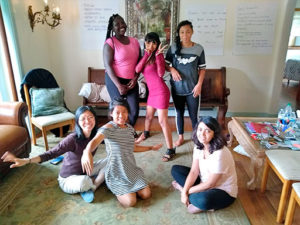
Meanwhile in Erie, Pennsylvania, a retired couple and a college-age youth were carrying out a similar strategy — albeit on a smaller scale and without the experience of Boston’s extensive prior activity in neighborhoods.
Tom and Pohleng Howe had arrived in Erie in February 2018 with a vision. They wanted to help Baha’i activity in the Erie-area cluster of communities move to a new milestone of development: tens of Baha’is and friends serving hundreds through the core activities of community building.
They consulted with area Baha’is about focusing their initial efforts on a neighborhood with a diverse population and lots of young people. After a study of demographics and several visits they selected an area on the east side of the city that is home to various immigrant groups.
A number of outreach attempts were conducted throughout the spring, says Tom Howe. Multiple visits were made to Nepali community leaders, who expressed support for the process.
In May, after hearing Nadarajah’s inspiring narrative at Green Acre, the Howes and others began to plan for their own 10-day camp. But they felt one more piece — a younger partner — needed to be in place before the camp could be organized.
With that in mind, a team of Baha’is volunteering at the regional level approached Shreeti Thapa, the only Baha’i youth in Erie, about serving full time over the summer. Financial support from Baha’is and encouragement from individuals and institutions made this service possible.
A summer service team was formed for Erie and Thapa moved into the Howes’ two-bedroom apartment in June after she came back from initial training at Green Acre.
Thapa has “unique aptitude” in Nepali language and culture, Howe says, so early outreaches focused on residents of Nepali Bhutanese background. “A big breakthrough and confirmation came when we met a key community leader and he offered his office to use for youth gatherings,” he says.
Also, the Howes walked the streets and got to know African and Middle Eastern refugees. Initially parents seemed more interested than the youths, says Tom Howe, but that changed when talk turned to the concept of a camp.
“The word ‘camp’ galvanized the youths, … whose electrified intense interest provided the means to have deeper conversations to explain the purpose of the camp, the training, study, service, etc.,” recalls Howe.
Eventually with 10 youth participants, the camp proved “exhausting but very productive,” he says. “We had to focus a lot of energy around providing sports and recreation, and there were some cultural challenges, but the camp was quite successful.”
Four teams of two to three youths each were formed at the camp: two teams to start children’s classes and two to start junior youth groups.
Rochester: part of a new community
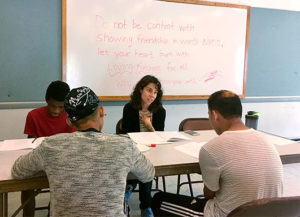
Inspired by the success of the Erie camp, Baha’is and friends in Rochester, New York, decided to create their own youth camp to train youths to serve their community as animators of junior youth groups and teachers of children’s classes.
Materials used in the Erie camp were customized for Rochester. Then, over two weeks, a team shared them with young people in the Maplewood neighborhood.
“The team broke up into pairs and visited homes of youths who had previously attended children’s classes and junior youth groups,” outlines Karen Marquardt. “These youths brought the team members to the homes of their friends, who were invited to the camp.”
In the span of one week the team signed up 18 participants — 11 girls and seven boys — for the youth camp. Eleven participants had no exposure to the Faith, and all except three were Nepali immigrants.
The event was held at a campground in Painted Post, New York, with Rochester-area Baha’is donating funds so the youths could attend at minimal cost.
The campus provided breakfast, lunch and dinner, says Marquardt, as well as access to a large swimming pool, a rock climbing wall, nature trails, and a bonfire.
The youths completed Book 1, then covered sections of Books 3 and 5 to prepare for immediate service when they returned home. As it happened, the girls chose to be trained as children’s class teachers and the boys as junior youth group animators.
Over the course of the camp, transformation on several levels was observed among the young people, says Marquardt. “For most of the participants this was their first experience being away from home, … but by the end of the camp they had adjusted to the feeling of being apart from their parents and part of a new community.”
Devotional gatherings were held every morning and evening, followed by Baha’i songs.
Marquardt says six of the girls with no previous Baha’i experience volunteered to write an original song summarizing the ideas they learned from Book 1.
One verse goes:
“Be an example for others, be truthful and kind.
“If you want your community better start with your heart, change your mind.
“Be an example for others, be truthful and kind.
“If you want your community better start with your soul, let your hearts bind.”
With a lot of enthusiasm centering on prayer and song, the youths showed that some of the language from study materials was influencing their thinking as new topics came up, says Marquardt. The material from Books 3 and 5 also started to become part of their discussions outside of study.
A blossoming of core activities
Since the initial camps, all three localities have seen a blossoming of core activities for young people.
In the Boston area, four children’s classes and two junior youth groups emerged as youths returned home eager to start their own activities with neighbors and friends.
“Additionally, now we have vibrant weekly youth gatherings that bring most of these youths together for singing devotionals, continued study of the institute courses, and socialization with one another,” says Thapaliya.
With the help of their tutors, the four newly enrolled Baha’i youths have also started hosting Baha’i community gatherings such as Nineteen Day Feasts.
“One of the youths, after reading the section on the Baha’i Feast in Book 2, remarked how ‘cool’ it would be to host Feast in her own house since Baha’u’llah promises that the house that hosts it would be blessed,” Thapaliya relates.
“These comments have been eye-opening for us as they showcase a glimpse of a new culture emerging as a population draws closer to Baha’u’llah through the institute.”
In Erie, the returning youths are being accompanied as they begin offering children’s classes and the junior youth program to neighbors.
The neighborhood team also has been reaching out to other youths in anticipation of holding another camp in early winter. And Thapa has taken up residence in an apartment the Baha’i community rented as a center for youth gatherings, training sessions and core activities.
In Rochester, continued study of Book 5 after the camp led three boys to assist with existing junior youth groups. They have said they look forward to starting their own groups soon.
Three girls started a children’s class for neighborhood children, and two other girls started a children’s class with family members.
Marquardt says many of the participants came together at the Rochester Bahá’í Center for a youth camp reunion with prayers, songs and games.
“Further events are being planned to take advantage of the time youths have off from school,” she says. “These include day camps for long weekends, a seven-day winter camp and two additional weeklong camps during summer 2019.”


